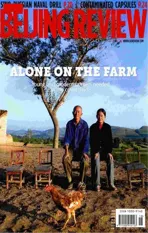SUPER FARMER
2012-10-16ChinesefarmeruseseconomiesofscaletoincreaseagriculturalproductivityByTangWeibinHuangYan
A Chinese farmer uses economies of scale to increase agricultural productivity By Tang Weibin & Huang Yan
COVER STORY
SUPER FARMER
A Chinese farmer uses economies of scale to increase agricultural productivity By Tang Weibin & Huang Yan
A large stretch of freshly plowed farmland bathes in the warm March sunlight in Longgang Village in Xiaogan City, central China’s Hubei Province.Beside the field, farmers employed by the Chunhui Group are digging and repairing irrigation channels.
Chunhui Group is an agricultural company that farms 6,667 hectares of land and boasts an annual production value of 2.5 billion yuan ($396 million). It operates four agricultural cooperatives and one research institute. Because of the group’s scale, its president Tan Lunwei is nicknamed a “super farmer.” Tan used to be a businessman. He went into farming two years ago because of his insights into modern agriculture.
In 2007, Tan, then a real estate developer,entered the grain storage business. Since local purchases could fill only 80 percent of his granaries’ capacity, every year he had to purchase grain from Henan Province, a major grain producer in central China.
But according to Tan, transporting grain was costly and the quality of grain was not guaranteed. Then, the idea of growing grain himself fi rst occurred to him.
“When visiting villages, I was shocked to find that those working in the field were all aged in their 60s and most young farmers had moved to cities to work. Large parcels of land were lying in waste. Ten years later,these farmers will be too old to grow crops.Then who will produce grain?” Tan said. This thought increased his determination to farm the land.
Scale production
When traditional agricultural production methods are challenged by rapid urbanization,agriculture must be modernized to ensure food safety, Tan said.
In March 2010, Chunhui Group’s subsidiary Weiye Chunhui Rice Co. leased 1,333 hectares of land in the rural area of Xiaogan to grow rice.

A BIG PRIZE: Tan Lunwei stands next to a tractor awarded to him by the local government for his contribution to agriculture
In 2011, the group set up Longgang Land Shareholding Cooperative, which covered eight villages in Sancha Township in Xiaogan. Chunhui Group contributed agricultural machines, while villages contributed land. The cooperative is managed jointly and pro fi ts are shared.
Liu Shuntian, director of the cooperative,said that a few years ago many plots of arable land in local villages were left uncultivated,and at maximum, the idle land accounted for half of the total availability.
“Now through intensive management,crops have been planted in all the land parcels. We are very happy to see that,” Liu said.
Tan has also formed cooperatives with farmers in other places in Hubei such as Hanchuan, Yingcheng and Yunmeng.Through cooperative, long-term land leases or seasonal short-term leases, Chunhui Group manages nearly 6,667 hectares of land.
“We can realize mechanization and scale of production and increase labor productivity by pooling land together,” Tan said.
In the compound of Chunhui Group is a spectacular array of agricultural machines,including tractors, rice transplanters, planters,harvesters and mist sprayers.
“These are not all our machines. We set up an agricultural machinery cooperative and farmers can contribute their machines as a share. The income from leasing machines in sowing and harvesting seasons is split according to share ownership,” Tan said.
On January 4, members of the Longgang Land Shareholding Cooperative got their first dividend. Wang Yulan, a villager in Longgang Village, said that she was paid 7,500 yuan ($1,189) for renting out her 1.1 hectare of land last year, and she was paid an additional 5,500 yuan ($872) for working as an agricultural worker in the cooperative for four months.
“Now I can earn a salary without leaving my hometown. The deal is pretty good,”she said.
Tan is drawing a new blueprint. “In two to three years, we are going to add 33,333 hectares of rice paddies, so that we can further improve productivity and increase farmers’income,” he said.
Science-oriented
The Chunhui Agricultural Academy is Chunhui Group’s research arm, running a large intelligent seed nursery. An imported seed germinator bought with 300,000 yuan($47,553) has signi fi cantly improved its seed germination rate and seedling quality.
In Chunhui Group’s rice paddies, a U.S.-produced computer-controlled land scraper is used to level the fi eld, which can improve land productivity and save water and fertilizers. A solar-powered extermination lamp is used to kill insects. A security monitoring room has been built to monitor the 400 plus hectares of land near Longgang Village. The fi elds 10 km away and vegetables in the seedling greenhouse are all under the watch of surveillance cameras.
Tan said that an asset more valuable for Chunhui Group than machinery is agricultural scientists and technicians. Last year, Chunhui Group recruited more than 30 college graduates. They are assigned to work in the field,engaging in agricultural production and management.
Wang Jinwei graduated from the Agronomy Department of Xiaogan College.He said, “Here, I can put what I have learned into use, and realize my value in life.”
At an intelligent drying plant that can dry 480 tons of grain everyday, Tan said that many problems in traditional agricultural production can be solved by extending the production chain.
“At present, the pro fi t from crop planting is still very low. Last year, I just broke even,” he said, “We should continue to complete the production chain, further process agricultural products, develop ecoagriculture and improve grain warehousing and logistic services.”
(The article fi rst appeared in Chinese on Xinhuanet.com)
